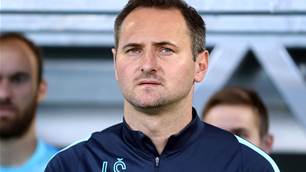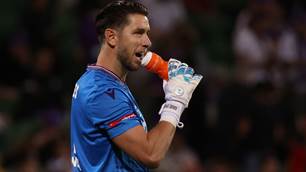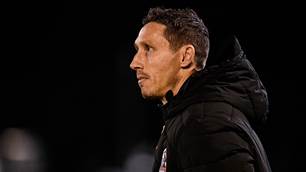Twelve clubs have been announced as the provisional entrants in the first season of the WA NPL.
After weeks of rumour and speculation, it's official - the list of provisional entrants in NPL WA 2014 is in. Previously, I'd written about some of the concerns among the WA football community, one of which was the possibility of a purely zonal approach being taken to the competition. Now that the list of participating clubs has been released though, it's clear that a zonal competition isn't going to happen:


The fact that all but one of the existing Premier Division clubs in WA have kept their position seems to indicate a nod to the idea of preserving a status quo, rather than adopting a zonal system. For this, Football West and their NPL board have won some praise and in my opinion this is justified. Unfortunately, there are some individuals in the football community here in WA who, like many others in Australia, will never be happy with the decisions made by a governing body. Despite the pure zonal system they railed against not materialising, they've found new and different reasons to put a negative slant on the NPL story, without wanting to see any benefits to the new system. While not entirely unexpected - this is Australian football after all - it is disappointing to see. However, that's not to say that the new NPL is without flaw; and there are some genuinely vexing questions that have come from the announcements and started a new round of rumour and discussion in WA, some of which we'll now examine.
A Relegation Without Relegation
The NPL board may have favoured mainly the status quo in the current league, rather than a zonal system, but surprisingly the one team to miss out was the one Premier Division team who could be counted as something of a regional side already, Bunbury Forum Force. With a large facet of the NPL supposedly about ensuring that talented youngsters from a large geographical spread could get access to high-quality football, it is somewhat surprising that the one Premier Division team in WA's South West region would miss out. The omission of Bunbury has been met with outrage and anger in some quarters, especially outside of Perth, and a petition has sprung up calling on Football West and the FFA to reconsider their place in the new competition - Football West has since responded that they may consider including Bunbury in 2015. In turn, one of the main targets of anger over Bunbury's omission has been the one team that has found a place at WA soccer's new high table from outside the Premier Division - current Division Two side Subiaco AFC.
The Two Lions
WA's Division Two competition is currently fought out amongst eight teams. It is the lowest standard of Saturday football available, and Subiaco AFC currently sit fourth on the table with more losses than wins. Whatever the reasons they were included as an NPL side, it's fair to say the Lions' league standing or state reputation was not one of them. The club claims to have a history all the way back to 1909, and in some sense this is true - like many Australian clubs it has gone through various rebrands, splits, and reformations from the days of Subiaco City all the way through to Subiaco Stirling, Balga West Coast, and Subiaco United. The current 'Subiaco AFC' brand has existed since 2009, when Subiaco City and Subiaco United merged junior and senior teams. Their junior pool is thus quite large, with about 600 kids playing in over 40 teams.
Interestingly though, their main ground Rosalie Park is not really what you'd call NPL standard - so Football West has allowed them to play their NPL games at the WA Athletics Stadium in Mount Claremont, a venue other clubs have allegedly tried to move to before with little success. Football West praised Subiaco's NPL bid and said in their press release that the club "has the structure, personnel and resources to make a successful transition". Interestingly, Perth Glory's current CEO Jason Brewer is a former Subiaco AFC president - although before too many conspiracy theories arise, he confirmed for me that he'd actually provided assistance to the ECU Joondalup bid before becoming Glory CEO, and had no role in Subiaco's successful NPL application. In fact, the Lions' bid was so successful that they received a higher score than their namesakes, Stirling Lions, who finished as the top ranked team in WA's Premier Division this season - a whole twenty seven places above where Subiaco AFC finished. So what exactly was this criteria?
Talk Or Walk
What is more important - someone saying that they'll do something, or the means they have to actually do it? It's a question that bears some thinking about when it comes to the NPL scoring system for WA applicants. The assessment process is detailed here and basically splits the scoring into two sections - Part A deals with the quality of the club's NPL submission, their justification for an NPL license, the standard of their presentation to the board, and their support for the NPL philosophy. Part B is the actual eligibility criteria - the boring stuff like finances, governance, facilities, medical, coaching qualifications, youth development, etc. In a decision that surprises me, the scoring system was weighted 70% to Part A and 30% to Part B; implying that a club's talk about a future in the NPL is more important than the stadium that they own or the world class youth development system that they might have. In fairness to Football West, whilst I do not agree with these criteria as they stand, it should be pointed out that the document is quite transparent - including conflicts of interest that were raised against some board members. Again, this is something that they should be commended on, as this could easily have been lost in the ether of football bureaucracy.
The scoring system above goes some way to explaining the surprising (to me, at least) scores below:

To explain my surprise at these scores for those who might not be familiar with WA football, I should point out for example that Balcatta SC play at a suburban park with temporary fencing around the perimeter of the pitch; whereas Bayswater City have a far more impressive ground at Frank Drago reserve, won last year's league competition, and have ex-Perth Glory players in their current lineup. The aforementioned Subiaco AFC also outscored Bayswater, and current league winners Stirling Lions finished some way down the list despite a decent stand, bar, and clubhouse of their own. ECU Joondalup have a very successful youth development system, yet Sorrento finish nearly two percentage points higher despite there not being much difference in the quality of their facilities at all. That's not to cast aspersions on any of these high-scoring clubs, but with only 30% of the score being made up by more "objective" items like finances and facilities, it does make it difficult for a neutral to judge what was good and bad about the other 70% of the bid.
Perth Glory / NTC
One team that didn't have to put a bid in at all, to the consternation of some observers, was Perth Glory. They've joined the NPL by essentially merging with the existing NTC team that plays (for no points) in the WA Premier Division. New Glory CEO Jason Brewer was asked on local radio show Let's Talk Football just what the club's relationship with the NTC would now be, and he was happy to confirm that the senior team, essentially under 20s, would be run by Perth Glory and would essentially be made up of Perth's National Youth League players to give them year-round football. From under 18s down to under 12s, the existing NTC FFA junior development project would continue in its current form, just playing in the purple of Perth Glory rather than the state colours of the NTC.
Brewer was also keen to point out that Alistair Edwards and co. wouldn't be taking over the NTC in any form, but rather the Glory's coaching staff would be helping out the NTC where their own duties permitted, to pass down knowledge to other coaches and help oversee some of the young players' development. Personally, it's a move that makes sense - a team with no juniors combining with a team with no seniors - but I would like them to play for points and to the same rules as the rest of the NPL competition. I'd also be keen to ensure that they don't simply poach the most talented kids from other clubs, but rather concentrate on developing youngsters wanting to come in through the NTC pathway from the lowest age group up - something that is entirely the point of the FFA junior development program.
Restraint Of Trade
Of all the discussion and debate around the NPL though, no issue stirs up more emotion than the player points system. Current Premier Division players have been united in their distrust of the system; among them Aleks Vrteski, the ex-Perth Glory keeper who has been interviewed in various media sources talking about the problems the points system presents for players over the age of 25, who attract extra points every year they age. Figures show that Subiaco AFC themselves with their current squad would be well over the 250 point cap proposed for WA NPL teams; as would every current Premier Division side in the state. For Brendan Schwab, the age issue is almost secondary to his primary concern though - the idea that players transferring from one club to another, in many cases to further their own development as young footballers at a team with better facilities and coaches, will attract an eight point penalty when joining their new team. Schwab sees this system as a restraint of trade, counterproductive to encouraging the development of young players, and a violation of FIFA regulations around transfers and player registration.
These are strong claims from someone not unfamiliar with taking on footballing authorities in this country and winning concessions - already, the PFA have established that ex-A-League players will be exempt from any points system in the NPL, so that in the event of leaving an A-League club these players still have a chance to build their career and develop as footballers ready for another crack at the highest level in Australia. It's hard to disagree with his point of view when you hear Schwab talk about player welfare - and one sees the point he makes about transfer penalties, especially when you think about pre-Bosman days in football and the right of a player to freely leave at the end of a contract. It also helps that he has no issue with a limit on Visa players, a la the A-League, which backs up the PFA's claim to be interested in the development of Australian footballers. With more meetings scheduled between NPL clubs and Football West, as well as FFA and the PFA, you feel this is certainly one issue that won't be going away quickly.
Overall, I still think the NPL will be looked back upon as a positive step for football in Australia, no matter the pain that is caused in its formative years. You can't help but feel however that some of the pain could have been avoided, with some (arguably simple) modifications:
- Points discounts for existing Premier Division veterans based on their length of service to the WA game, extending their careers in the points based system, whilst keeping points barriers for new import players.
- A 14-team competition rather than 12, meaning Bunbury could enter the 2014 NPL along with another southern club, potentially Mandurah or Rockingham, to create further development areas for young players.
- A 'marquee' system similar to the A-League where one player in each squad could be paid outside of the normal regulations and exist outside of the points cap; perhaps best used on a visa player with talent and skill who in turn may one day be of interest to an A-League side.
In any case, these are just one person's thoughts on where some improvements could be made. There is no doubt that the PFA, Football West, clubs, and the FFA will continue to work out how the new league will work come kick-off in 2014; but in the meantime it's worth remembering that for all the issues there are to iron out, we'll have a chance for state league sides to showcase their talents on the national stage at the end of the NPL season, pitting themselves against clubs from all around Australia. Surprisingly, that's something that gets left out of a lot of discussions about the NPL in WA; perhaps due to our parochial nature or isolation from the rest of the country. It is the National Premier Leagues for a reason; and whatever kinks might still exist in the WA and Victorian rulebooks, I can only hope that they're ironed out and we have a great second-tier competition in this country in a few years' time. Surely that's something all parties can agree on?
Related Articles

'Up to the players': Croatia deny spying trip for A-League, NPL youngsters

Socceroo ruled out for A-League season, retirement likely as Glory sign NPL replacement













